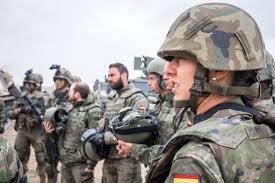NATO soldiers on guard in Kosovo Serb town after clashes
Dozens of NATO troops secured a municipal building in the Kosovo town of Zvecan on Tuesday, a day after 30 NATO soldiers and 52 Serb protesters were injured in clashes that EU and NATO officials said were unacceptable as they urged calm.

Dozens of NATO troops secured a municipal building in the Kosovo town of Zvecan on Tuesday, a day after 30 NATO soldiers and 52 Serb protesters were injured in clashes that EU and NATO officials said were unacceptable as they urged calm. Kosovo police said in a statement that the situation is "fragile, but calm."
Russia said on Tuesday "decisive steps" were needed to de-escalate tensions in Kosovo. "We call on the West to finally silence its false propaganda and stop blaming incidents in Kosovo on Serbs driven to despair, who are peaceful, unarmed, trying to defend their legitimate rights and freedoms," Russia's foreign ministry said.
Unrest in the region has intensified since ethnic Albanian mayors took office in northern Kosovo's Serb-majority area after April elections the Serbs boycotted, a move that led the U.S. and its allies to rebuke Pristina on Friday. The area's majority Serbs have never accepted Kosovo's 2008 declaration of independence from Serbia, and consider Belgrade their capital more than two decades after the Kosovo Albanian uprising against repressive Serbian rule.
Ethnic Albanians make up more than 90% of the population in Kosovo as a whole, but northern Serbs have long demanded the implementation of an EU-brokered 2013 deal for the creation of an association of autonomous municipalities in their area. Serbs refused to take part in local elections in April and ethnic Albanian candidates won the mayoralties in four Serb-majority municipalities - including North Mitrovica - with a 3.5% turnout.
CALM Several ethnic Serbs gathered in front of the building in Zvecan but the situation was calm, a Reuters reporter said, as soldiers from the United States, Italy and Poland stood by in anti-riot gear.
A Kosovo police source who asked not to be named, told Reuters bulldozers were heading north, ready to remove any barricades set by Serbs. Kosovo authorities have blamed Serbian President Aleksandar Vucic for destabilising Kosovo. Vucic blames Kosovo authorities for causing problems by installing new mayors.
"In a democracy there is no place for fascist violence—no appeal from ballot to bullet," Kosovo Prime Minister Albin Kurti said on Twitter late on Monday. In a statement after meeting ambassadors of the so-called Quint group - the United States, Italy, France, Germany and Britain - in Belgrade, Vucic said he had asked that Albanian mayors are removed from their offices in the north.
Kosovo President Vjosa Osmani said criminal gangs, supported by Vucic, aim to destabilize Kosovo and the entire region. VIOLENCE 'UNACCEPTABLE'
On Monday, Serb protesters in Zvecan threw tear gas and stun grenades at NATO soldiers. The NATO force, known as KFOR, said 30 of its soldiers were hurt in the clashes. Serbian President Aleksandar Vucic said 52 Serbs were injured. EU Foreign Policy Chief Josep Borrell condemned Monday's clashes, saying on Twitter: "The violent acts committed against @NATO_KFOR troops, media, civilians and police are absolutely unacceptable."
Italian Foreign Minister Antonio Tajani told RAI public radio he had spoken to Vucic and Kurti late on Monday, inviting "everyone to be calm ... abandon violence." "KFOR will continue to take all necessary measures to ensure a safe and secure environment and freedom of movement for all communities in Kosovo, in accordance with its mandate," the NATO force said in a statement.
For a TIMELINE on Serbian unrest in north Kosovo, click here.
(This story has not been edited by Devdiscourse staff and is auto-generated from a syndicated feed.)










